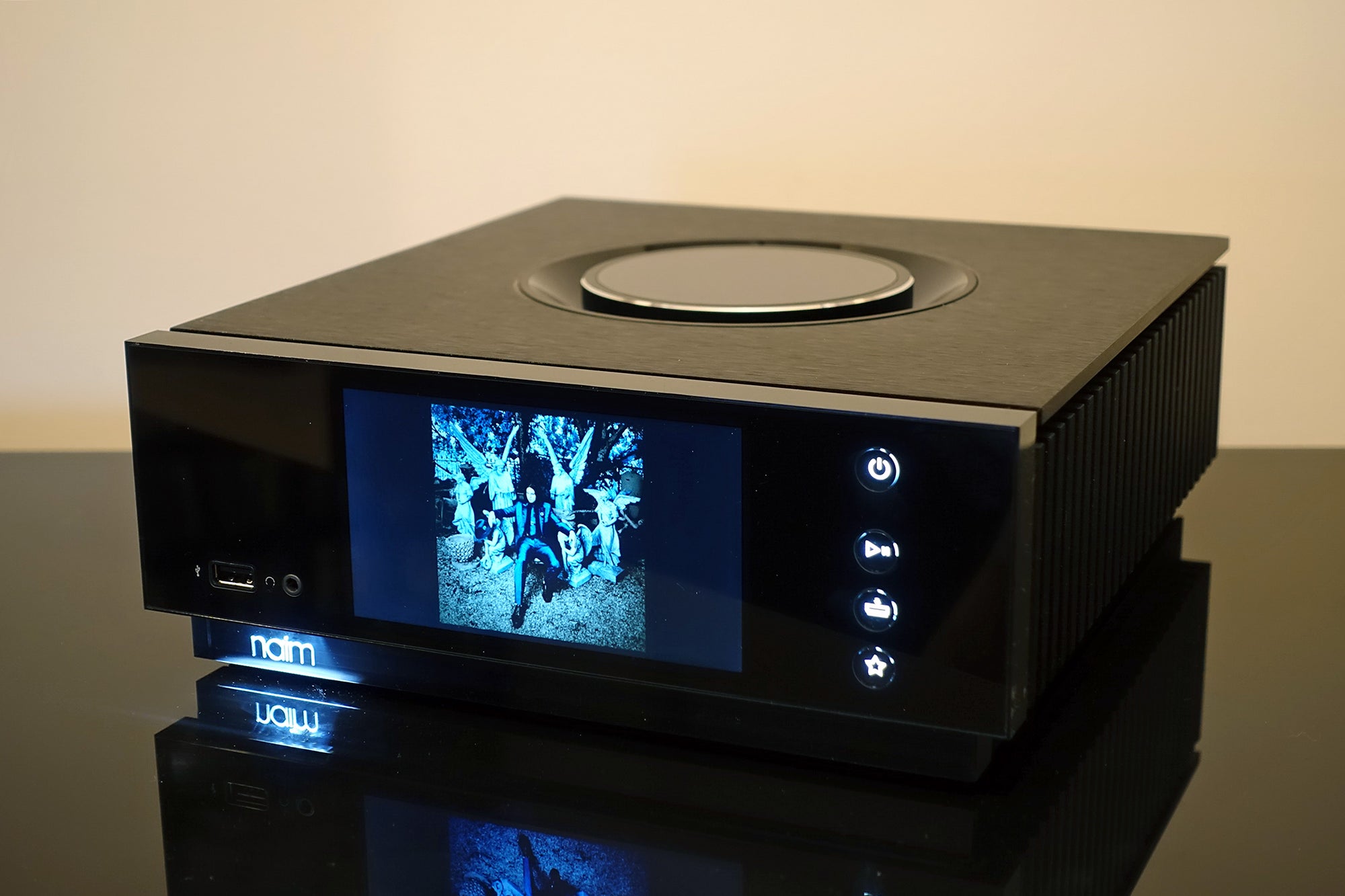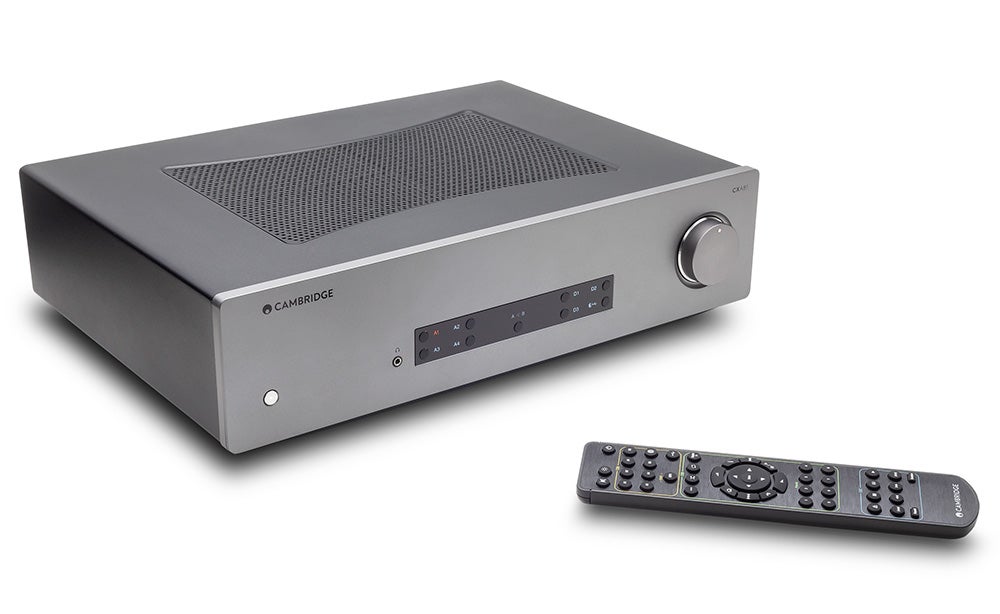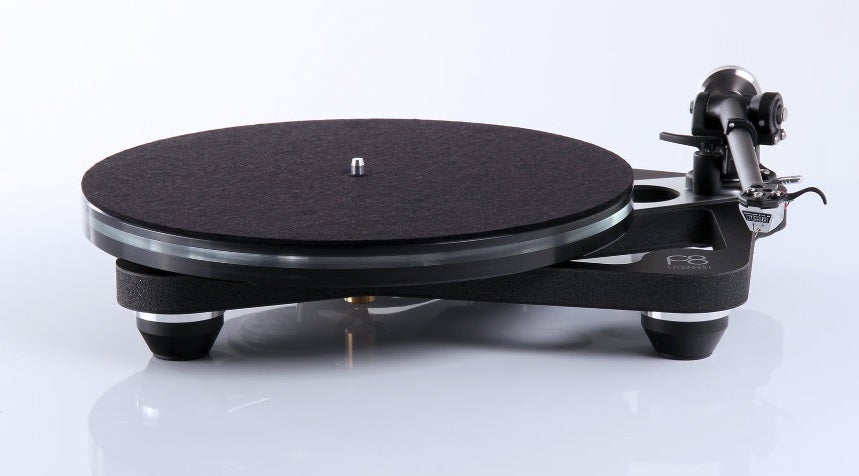Audiolab Omnia Review
Performance meets convenience…
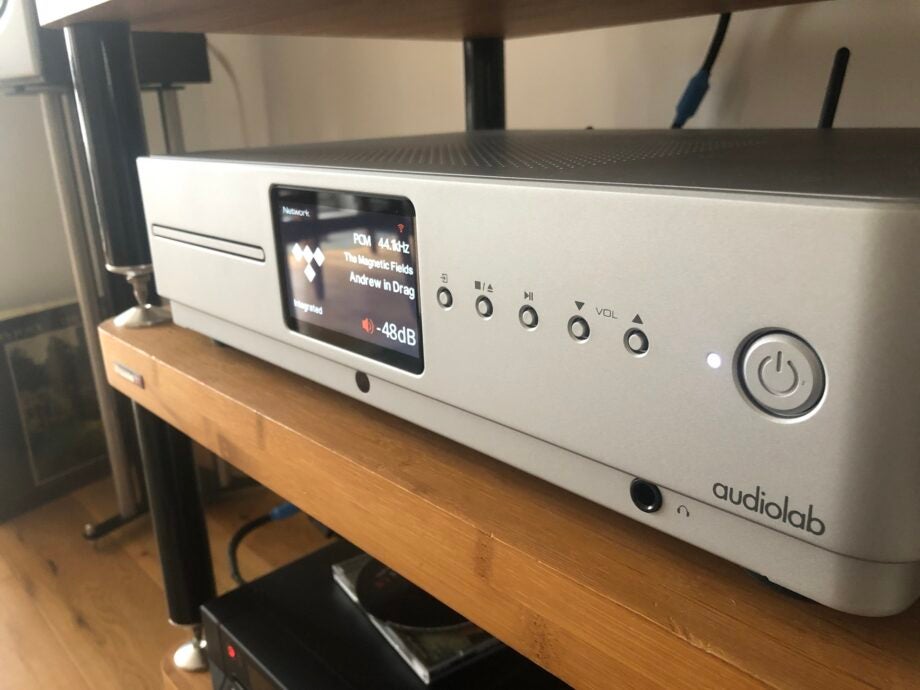

Verdict
More functionality than seems feasible, and a full-on serving of Audiolab sound quality at the same time. Performance, meet convenience…
Pros
- Wide-ranging functionality for both digital and analogue sources
- Bank-vault build quality
- Deft, accomplished and entertaining sound
Cons
- Can be slightly wrong-footed by more, er, abandoned recordings
- Won’t suit every pair of speakers
- Undermined just a little by its own remote control
Key Features
- DTS Play-FiCompatible with app for streaming high-res content to other devices
- Integrated CD drivePlay your favourite shiny discs
- 32-bit hi-res DACSupport music files up to 32bit/768kHz and DSD512
Introduction
Consumers won’t be told. Consumers do the telling. That’s why long-established and ‘serious’ hi-fi brands like Audiolab are turning out products like the Omnia. Because consumers want performance and convenience and they refuse to accept it’s an ‘either/or’ deal.
Omnia is a just-add-speakers all-in-one stereo system – and, when compared to most nominal rivals, it’s even more ‘all’ than most. From high-resolution digital audio streaming to vinyl via compact disc, the Omnia has you covered.
But there’s more to delivering a do-it-all system than just cramming a stack of functionality into an aluminium box and hoping for the best, of course. Especially when you’re asking £1599 for the aluminium box in question…
Availability
- UKRRP: £1599
- USARRP: $2299
- AustraliaRRP: AU$2999
The Audiolab Omnia is on sale now, and in the United Kingdom the asking price is £1599. In America you’ll be asked to part with £2299, while in Australia the going rate is around AU$2999.
The ‘premium all-in-one’ market has left the doldrums behind it lately, and the Omnia will be hoping to turn the heads of customers who’ve been eyeing up the likes of Cambridge Audio’s Evo 75 (on the basis that the Audiolab is better-specified) or Naim’s Uniti Atom (on the basis that the Audiolab is better-specified and quite a lot more affordable). All it has to do is sound excellent from all of its many source possibilities and the job will be more-or-less done. Easier said than done, though, obviously…
Design
- Lean looks, chunky build quality
- Classic kit-rack dimensions
- Available in black or anodised silver
Very little about the way Omnia is designed gives the game away. This is a standard-sized (156 x 440 x 327mm, hwd) piece of hi-fi equipment, pleasingly curved at the corners and sturdily purposeful in appearance rather than in any way decorative. Both the Evo 75 by Cambridge and the Uniti Atom by Naim (both of which are more expensive, let’s not forget – the Naim by quite a distance) will pander to your idea of ‘lifestyle’ a little more than this Audiolab.
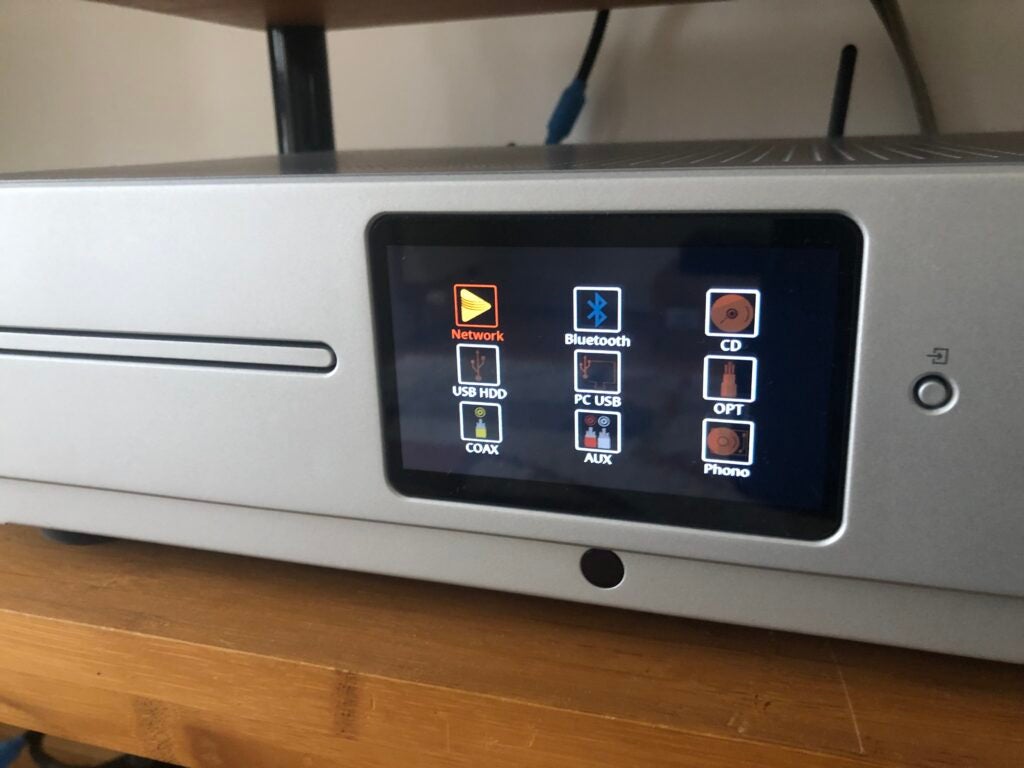
That’s not to say it’s austere, though. There’s a 4.3in LCD screen front-and-centre, a smattering of physical controls to its right and what older readers will recognise as a disc-drawer to its left. A big ‘power on/off’ button, a IR receiver for a remote control and a 6.3mm headphone socket complete the fascia.
This is a robust, weighty (a touch over 9kg) and properly constructed box – and if it doesn’t go all the way to justifying your outlay by itself, neither does it suggest you might have overpaid.
Features
- 32-bit ESS DAC
- Bluetooth 5.0 with aptX HD
- MM phono stage for a turntable
Yes, this is a reasonably sizeable box – but when you consider the amount of stuff Audiolab has managed to incorporate, it’s mildly surprising Omnia isn’t the size of a fridge.
First of all, Omnia is a stereo amplifier. Unlike a lot of its rivals, which use Class D amplification primarily because of its high efficiency, Audiolab has fitted Omnia with the rather more credible Class AB alternative. Class AB doesn’t quite have the energy efficiency of Class D, but (if implemented properly) it’s capable of sound more readily describable as ‘hifi’.
Power is quoted as 50 watts per channel into an 8ohm load – which isn’t going to win Audiolab many awards when it comes to big show-off numbers but ought, in reality, but more than enough to drive Omnia’s likely loudspeaker partners.
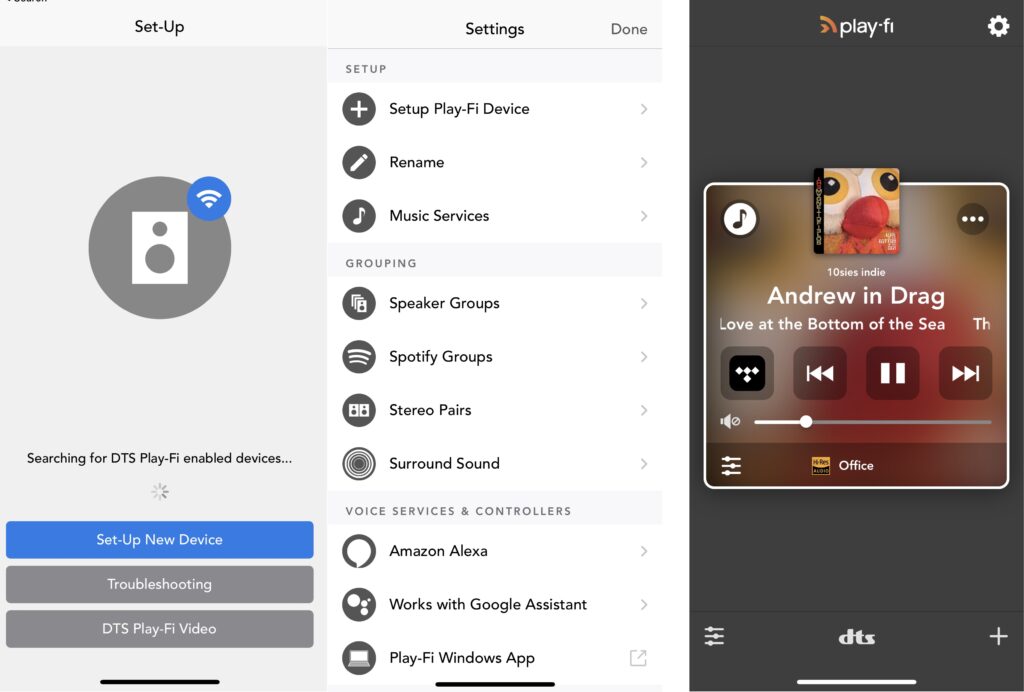
And then Omina is a network streamer. It’s built on the DTS Play-Fi platform, which means a stable and sensible control app along with plenty of multi-room possibilities – and it’s simple to integrate your preferred music-streaming services and/or internet radio providers. It’s Roon tested, is compatible with UPnP, has Spotify Connect integrated and will handle any DLNA network-attached storage without alarms. The onboard DAC is the Sabre ES9038Q2M by acknowledged masters ESS, and it’s good to a heady 32bit/768kHz and DSD512 standard.
Digital inputs extend to a couple of digital optical and digital coaxial sockets (each with a more-than-adequate 192kHz upper limit), type A and type B USB inputs, and an Ethernet socket (the Omnia has dual-band wi-fi, naturally, but you can’t put a price on network stability). Each digital input offers full MQA decoding, too. The Omnia also has Bluetooth 5.0 connectivity, with aptX HD, aptX Low Latency and AAC codec compatibility. Oh, and there’s also a CD drive – because despite the popularity of compact disc falling off the proverbial cliff lately, legacy collections should be cared for.
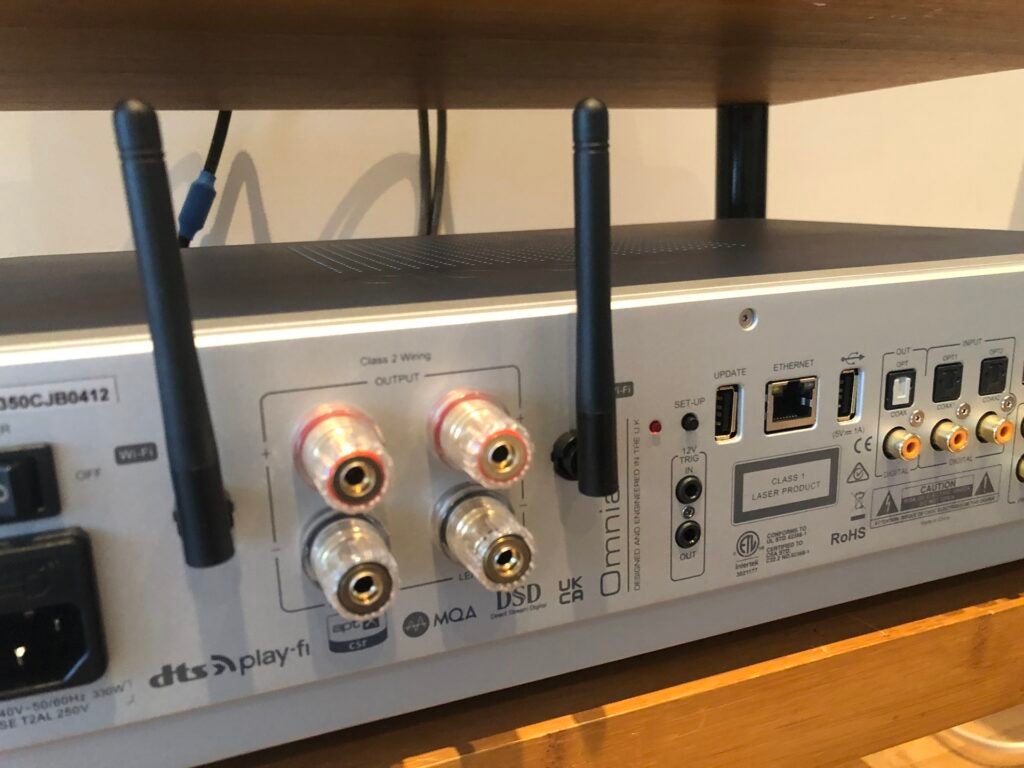
And if all of these digital possibilities aren’t enough, the Omnia also features three line-level analogue inputs and a moving-magnet phono stage for use with a turntable. As you might imagine, it’s all go on the Omnia’s rear panel – but Audiolab has also found room for stereo RCA pre-outs for use with a power amplifier, optical and coaxial digital outputs and binding posts for a pair of speakers. ‘Exhaustive’ just about covers Omnia’s functionality – and that’s even before we mention the option to have that LCD panel display digital or analogue VU meters rather than less visually exciting information.
As well as the DTS Play-Fi app, the Omnia can be controlled (to an extent) with its fascia buttons or (completely) with the supplied remote control handset. The former are rather leisurely in their responses, and the remote control rather recklessly features grey text on black buttons – but ultimately you should have no problem getting Omnia to do your bidding.
Sound quality
- Full-scale, tonally even and quite spirited sound
- Consistent sound from every input
- Unmanned slightly by rough and/or raucous recordings
Happily, the Audiolab proves pretty much agnostic when it comes to the sort of music you like to listen to. It’s also remarkably consistent, tonally, across each of its numerous inputs – there are variations in volume between, say, a TIDAL Masters stream via the DTS Play-Fi app and the same song played via a turntable through the Omnia’s phono input, but in terms of tonality and overall sonic attitude it’s unshakeable.
What this means is that you get a full-range, precise and rather self-consciously ‘grown up’ reading of your favourite music – and that’s meant in an entirely positive way.
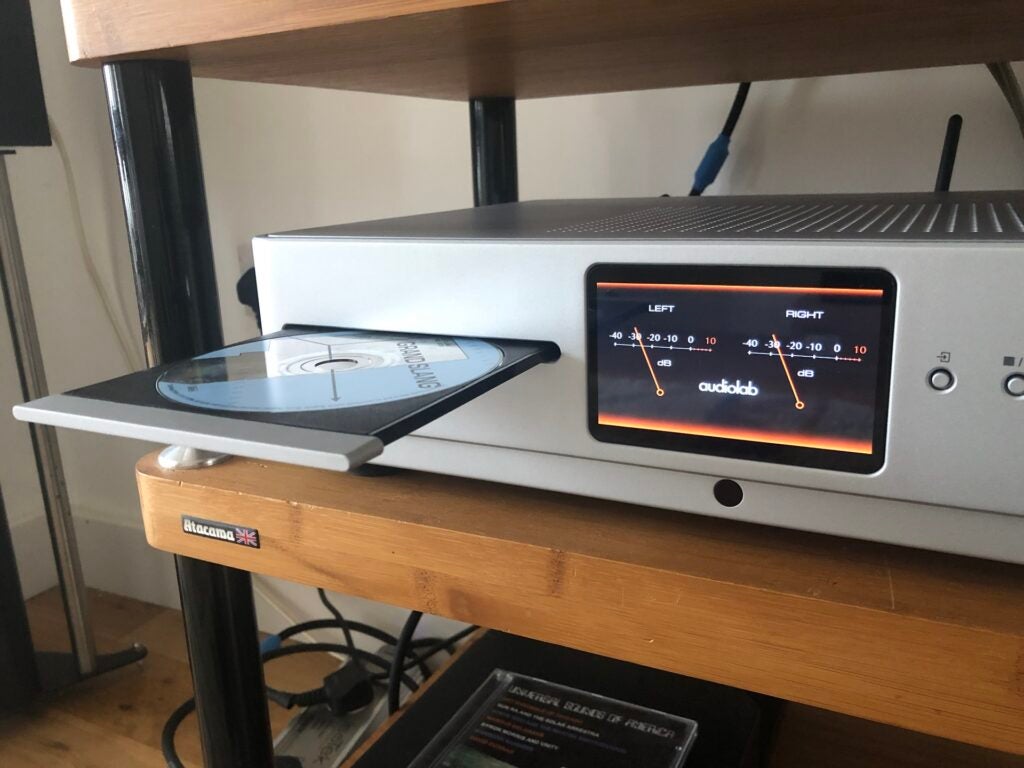
The frequency range is unified and coherent from the (deep, textured and decently rapid) bottom end to the (politely crisp and attacking) top. The Audiolab reveals a thoroughly satisfying amount of detail in the midrange, which means a stream of Alice Coltrane’s Rama Katha is alive with character and emotion, even if (like me) you don’t understand Sanskrit. Even though this recording is spare in the extreme, the Audiolab manages to grant it a sense of scale, and is alert to the harmonic variations in the droning organ.
Switch to something more readily identifiable as ‘a song’ (Andrew in Drag by The Magnetic Fields) and this all-in-one offers straight-edged and believable timing, integrating the various instrumental strands into a cohesive entity and delivering them on a soundstage that’s convincing and easy to follow.
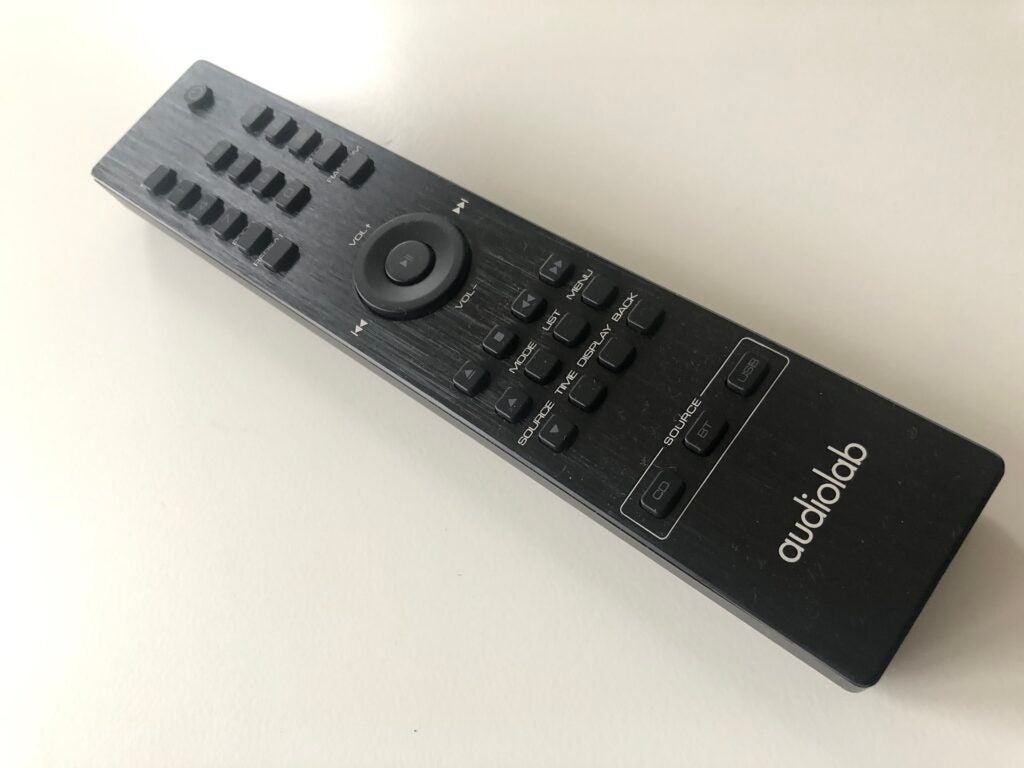
About the only time Omnia sounds anything less than fully assured and entirely in charge during the course of this test is with a listen to a vinyl I Wanna Be Your Dog by The Stooges. For the uninitiated, this is an unmusicianly rampage through three chords, fronted by a not-a-toss-given vocal, and with the metaphorical smell of cigarettes on its clothes and blood on its knuckles.
The Audiolab’s phono stage is well up to snuff in absolute terms, but the Omnia seeks to bring order and control while the recording resists with everything it has – and the result is a recording that should, by rights, have its eyes out on stalks is robbed of a little of its attitude and wonky swagger.
Despite the less-than-promising power output, the Audiolab has no problem describing both the broad dynamics of the recording and the minor variations evident in the overdriven guitar slashes. It breathes deeply and, as long as you avoid overtly demanding speakers, it will track dynamic peaks and troughs with ease.
Latest deals
Should you buy it?
You want a big system without having a big system The Omnia will support any stereo equipment you care to mention
You own truculent loudspeakers The Audiolab isn’t short of muscle, but it has its limits
Final Thoughts
Purists may insist (and not without justification) that keeping specific functions as isolated as possible produces superior results – but out in the real world, where space and expenditure are valid concerns, it’s often neither possible nor desirable. And as far as compromises go, the Audiolab Omnia is pragmatic and successful
How we test
We test every system we review thoroughly over an extended period of time. We use industry standard tests to compare features properly. We’ll always tell you what we find. We never, ever, accept money to review a product.
Find out more about how we test in our ethics policy.
Tested for more than a week
Tested using a range of sources
FAQs
You can use the Audiolab Omnia with Roon. It is Roon Tested, which means the system can de found on Roon networks and music playback controlled through the app.
The Omnia is capable of fully decoding MQA, so MQA files can be streamed or played (via the USB) at their original resolution.

